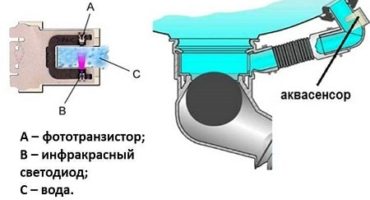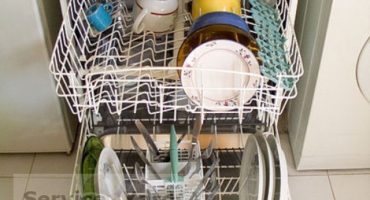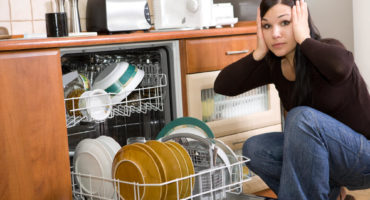The reasons why the dishwasher does not wash the dishes well, which affects this factor, are examined in detail. Potential equipment failures leading to the presented problem are listed.
Common reasons
Most housewives do not think about the proper operation of the equipment, which is why problems arise in the form of poorly washed dishes. If the dishwasher does not wash the dishes well, the following main reasons can be identified, the elimination of which will help to cope with the confusion:
- mistress of the hostess in operation;
- wrong dishwashing detergents;
- lack of timely cleaning of equipment;
- breakdown of a specific part or system of the machine.
To identify the causes of poor washing, you should carefully consider each factor that affects the poor quality of the procedure.
Untimely parts cleaning
Untimely cleaning of dishwasher parts is the most common problem of poor dishwashing. Here you should check each part individually for condition and appearance:
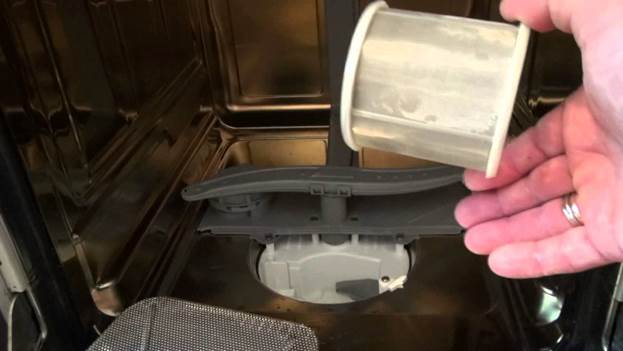
- Tank - most prone to contamination. Therefore, before each use of the equipment, check its condition. Mostly scum forms on its surface, which should be removed as often as possible using special cleaning products.
- Coarse filter - is a mesh part on the inlet hose. It is often clogged with rust, which, when the equipment is in operation, enters the tank and allows the occurrence of the problem in question.
- Water sprinklers - when they become clogged, poor-quality rinsing of the washed dishes occurs. Everything is explained by a decrease in pressure. For clogging the sprinklers are unscrewed, the nozzles can be cleaned with an ordinary toothpick.
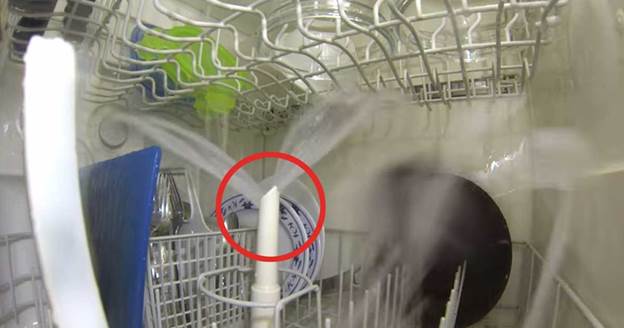
- The main filter - a special mesh is located at the bottom of the tank, which is also clogged with food debris. The filter is removed once a week and washed under running water without fail.
If you find that the dishwasher has become poorly washed, be sure to carry out a quality cleaning of the parts. If the situation repeats, pay attention to other reasons.
Use of low-quality cleaners
Poor cleaning can be due to the use of ineffective cleaning products or the erroneous acquisition of a fake of a famous brand. If the reason lies in this, then you will come across dirty dishes made of metal - pots and pans, because of their strong pollution, will not be washed off, they will remain greasy.
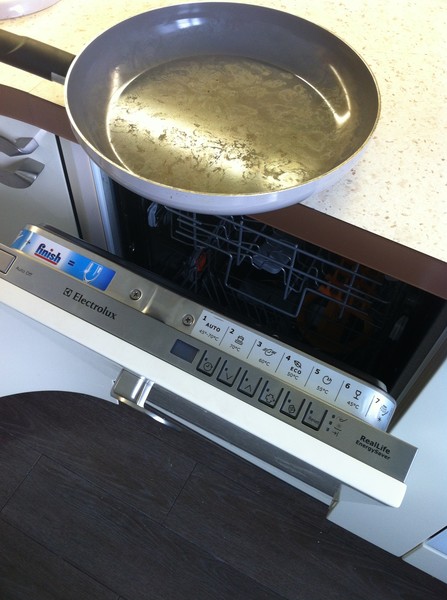
In the presented question, you may encounter the following problems:
- There are stains on the dishes - the reason is an insufficient amount of rinse aid. The solution to the problem is in the form of regulating the flow of funds - it is necessary to increase the pressure, slightly, so as not to provoke its difficult washing off.
- White smudges remain on the dishes - this is due to salt entering the tank. Check that the compartment cover is well closed.
- There are traces of tea, coffee or lipstick on the cups - this means that the bleach used is missing.
- Plastic dishes are poorly washed - for it, a special component is added to cleaners that allows you to wash plastic objects without streaks. If the quality of washing is not happy, then there is no special substance in the composition of the product used.
- The dishwasher does not wash away dirt and cleaning agent poorly - here it is appropriate to give an unconditional argument in the use of an inappropriate composition, which is often simply not intended for the specified equipment.
The solution to the problem related to the presented group of reasons is to change dishwasher. In most cases, housewives face similar problems immediately after acquiring the composition of a new advertised brand.
How to choose dishwasher cleaner, This article will help you.
Operation errors
The dishwasher does not wash dishes well if the equipment itself is used improperly. In this case, the following problems and solutions can be distinguished:
- Wrong arrangement of dishes - most housewives do not read the instructions for using their dishwasher and thereby make a blunder. Common is the incorrect arrangement of elements in the grid, namely, the overlap of one rad to another. So, the lower and upper row of dishes should be free and provide access to water for each other.
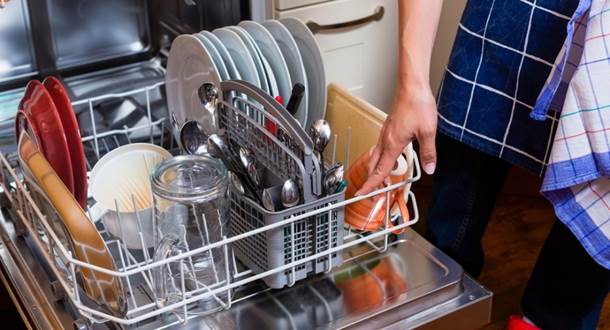
- Loading a lot of dirty dishes - the presented violation inadvertently entails the incorrect arrangement of elements. Here the problem lies only in the impossibility of water access to the dishes - especially its inner surface. To resolve the situation, you should timely place the dishes in the machine.
- Wrong mode of operation of the equipment - each housewife herself determines the degree of contamination of the placed dishes, but due to the economy puts on a fast mode of operation. As a result, the water is heated to only 50 degrees, which does not allow you to wash dried mud from a pot or pan.
To eliminate problems related to the presented category, you should re-read the operating instructions for your dishwasher. Different brands and models differ in configuration, which means that their use entails compliance with certain recommendations.
Possible breakdowns
If the dishwasher suddenly began to wash the dishes poorly, the cause of the problem may be hiding in a serious breakdown, which must be repaired in a timely manner. To understand which part has stopped functioning properly, the following instruction will help:
- Burned out TEN is a special electric heater that provides timely heating of water. Due to the fact that it is constantly in contact with water, scale is accumulated on it. The absence of its removal entails the breakdown of the heating element - it often burns out without suggesting restoration or repair. If the reason is precisely in the electric heater, the water in the dishwasher does not heat up, which means that all the dishes remain greasy.
- The sprinkler impeller has stopped working - this element is designed to spray water in order to clean all the dishes as much as possible. If the impeller does not work, it means that the water does not reach all surfaces, and the loaded one remains not washed.
- The turbidity sensor has burned out - the presented system is available in modern models of the corresponding equipment. The operation of the system is to transfer the water quality to the module - if it is considered cloudy, the washing should be continued, which is determined automatically. If the system fails, it means that the turbidity is not detected, and the machine automatically decides to end the cycle upon completion of the program time.
- The recirculation pump has broken down - in this case, the equipment will not start its work, since there is no water supply during the presented breakdown.
- The thermal relay burned out - this system is a transmitter to TEN about water intake in the car. The thermal relay at a certain moment gives a signal about the beginning of its operation and heating occurs. If the system does not work, the heater does not turn on and does not heat the water.
The dishwasher may work poorly or stop altogether due to an error in the operation of the control module.In this case, the system gives commands, which is why there is no water intake or heating. The presented failure requires serious repairs with the help of a special programmer.
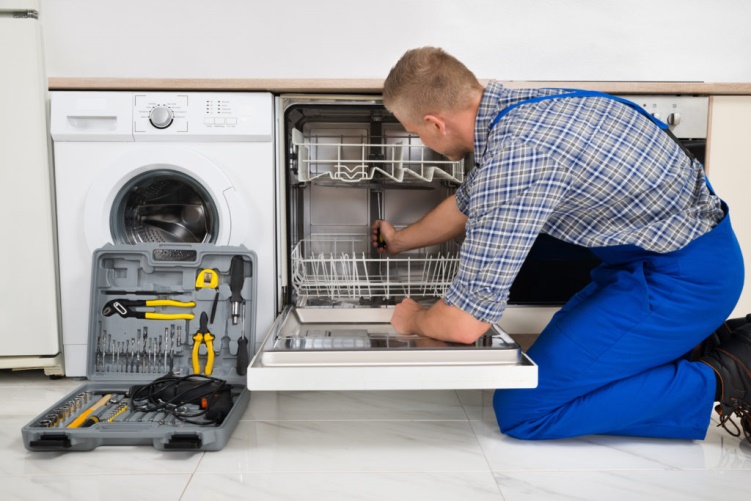
If the cause of dirty dishes or white coating after washing in the dishwasher is to break any element, you should call the wizard. The specialist will immediately determine the cause and the decommissioned part. If necessary, it will immediately replace it, and it will be possible to use the equipment in the near future.
What to do?
Having examined all possible causes, it should be concluded what to do if the dishes remain dirty. The sequence of actions of the hostess is as follows:
- If the dishwashing detergent has been replaced, change it again to a new one or return it to use. Look at the changes.
- If the tool has not changed, purchase it again in another online store. Perhaps a fake was bought, so there are no relevant and necessary elements in the composition.
- Increase the amount of rinse aid - this must be done every time a large quantity of dishes are loaded into the machine.
- Dip fewer dishes into the next load to eliminate the possibility of improper use of the equipment.
- Flush all equipment - instructions for timely and proper care have been described above. It is important to clear the machine of scale.
- Experiment with the mode of operation of the equipment - as a result of constant operation, the parts wear out and work in the wrong productivity.
- Check the sequence of the running program - as soon as the dishes are immersed in the tank and the program starts, water starts to be collected. It should be checked for quantity, as well as for subsequent distribution over the entire surface of the washable elements. It is also necessary to check whether the water is heating - the burnout of the heating element is a common problem in the breakdown of equipment. Try to determine the cause of the breakdown yourself to exclude possible other conditions.
If all the actions presented do not lead to a positive result - the dishes remain dirty after washing - contact the master who will be able to identify the problem, why the dishwasher does not work. Timely replacement of one part will prevent breakage of other systems.
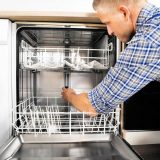 Malfunctions of dishwashers and methods for their elimination
Malfunctions of dishwashers and methods for their elimination 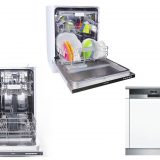 Dishwasher Tips
Dishwasher Tips 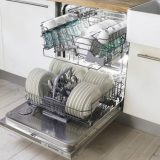 Choosing a dishwasher
Choosing a dishwasher  How to restart the dishwasher
How to restart the dishwasher 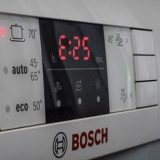 How to restart the dishwasher, how to reset the program
How to restart the dishwasher, how to reset the program 